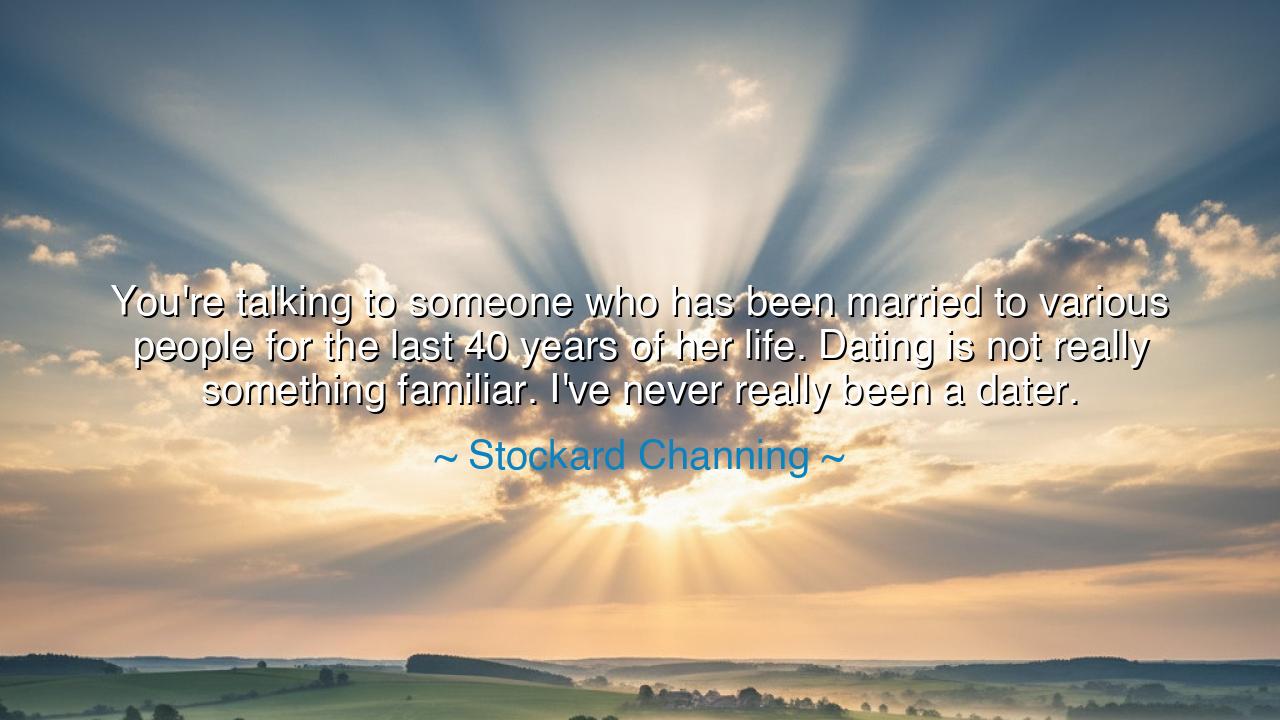
You're talking to someone who has been married to various people
You're talking to someone who has been married to various people for the last 40 years of her life. Dating is not really something familiar. I've never really been a dater.






“You’re talking to someone who has been married to various people for the last forty years of her life. Dating is not really something familiar. I’ve never really been a dater.” Thus spoke Stockard Channing, an actress of grace and wit, whose words carry a tone of humor wrapped in quiet wisdom. Beneath their lightness lies a profound reflection on the nature of commitment, identity, and the passage of time. In this statement, she reveals a truth known to all who have walked the long road of love — that life’s greatest lessons are not learned in fleeting encounters, but in the slow, enduring work of companionship.
When Channing says she has “never really been a dater,” she is not merely describing a habit, but a temperament — the soul of one who belongs not to the world of momentary passions, but to the realm of devotion. She speaks as one who has lived much of her life in the bonds of partnership, where affection must mature into understanding, and excitement must give way to endurance. Her words remind us that the art of love is not found in the search for novelty, but in the practice of constancy. To her, the act of “dating” — that ritual of beginnings — is distant and unfamiliar, for her life has been shaped by the middle and the after, by the seasons that come once the flowers of romance have faded into the quiet strength of loyalty.
The origin of her sentiment lies not in cynicism, but in experience. For forty years, as she says, she has known love not as a flirtation, but as a journey shared — sometimes joyful, sometimes difficult, but always real. To those who spend their days chasing the thrill of new affection, her words may sound foreign; yet to those who have built a life with another, they ring true. Marriage — in its many forms and stages — is not a single moment of passion, but a continual unfolding, a discipline of patience and forgiveness. The ancients would have called this the virtue of fidelity, the quiet heroism of staying when the first fires dim.
Consider the story of Penelope, wife of Odysseus, who waited twenty long years for her husband’s return from war. Many came to woo her, promising comfort and stability, yet she remained faithful, weaving and unweaving her tapestry as she awaited the man she loved. She was not a “dater,” nor a seeker of endless new stories; her strength lay in steadfastness, in the sacredness of endurance. Stockard Channing’s words, though modern in form, echo this same ancient spirit — the understanding that love’s truest glory is not in its beginning, but in its perseverance through the tides of time.
There is also humility in her tone — a recognition of the distance between generations. “Dating is not really something familiar,” she says, and through that, she points to the way the world of relationships has changed. In an age where love is often measured by convenience or novelty, where connection can begin and end with the swipe of a screen, Channing’s life speaks of another rhythm — slower, deeper, and perhaps more enduring. She reminds us that every era teaches love differently, but the essence remains the same: the longing to be known, to be seen, and to share one’s journey with another soul.
Yet her humor also reveals wisdom. When she speaks of having been “married to various people for forty years,” she does not boast of perfection; she acknowledges the imperfection of life — that love, like all human endeavors, is sometimes transient, sometimes flawed. But even in those changes, there is a lesson: to love is to try again. The heart, when wounded, does not die; it grows wiser. Her words carry the grace of one who understands that each union teaches, and that every ending, too, holds its own sacred instruction.
So, my listener, take from Stockard Channing’s reflection this teaching: that love is not a performance of beginnings, but a discipline of presence. Do not measure your worth by how many loves you have known, but by how deeply you have cared. Learn, as she has, that the true test of the heart is not found in the excitement of pursuit, but in the quiet courage of staying — of building, rebuilding, and forgiving.
And if you find yourself in a world that prizes the new over the lasting, remember this: the rarest beauty is constancy. The fleeting thrill of the chase fades quickly, but the steady fire of companionship endures like an eternal lamp. In Channing’s gentle irony lies a timeless truth — that to love well is not to seek endlessly, but to grow deeply; not to collect many hearts, but to understand one completely. For the greatest art is not in finding love, but in keeping it alive.






AAdministratorAdministrator
Welcome, honored guests. Please leave a comment, we will respond soon